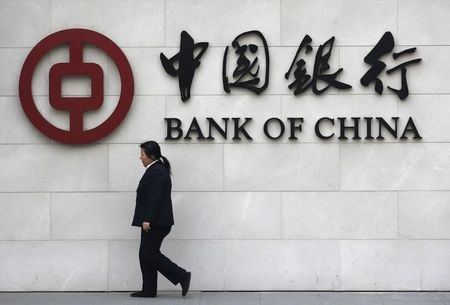By Lawrence White
HONG KONG (Reuters) - Bank of China (SS:601988) (BoC) on Thursday sold $6.5 billion (4.06 billion pounds) worth of contingent capital, launching a landmark wave of fundraising by China's biggest banks as they strengthen their balance sheets to meet new global bank capital rules.
It is the first time a Chinese bank has issued so-called additional Tier 1 preference shares, instruments which behave like bonds and convert into common equity if the bank's core capital falls below certain trigger ratios.
It is also the world's largest ever contingent capital deal, beating a $5.6 billion deal by HSBC in September.
As growth slows and bad debts build up, China's banks are rushing to replenish their balance sheets to meet the tough new global bank capital regulations known as Basel III.
This deal follows a wave of similar issuance by European banks earlier this year.
China's four biggest lenders are expected to issue $20 billon worth of additional Tier 1 and Tier 2 capital by the end of the year, according to Fitch Ratings.
The Chinese government has been rigorously enforcing Basel III regulations in its efforts to ward off a financial crisis following a huge run-up in debt since 2008 and a marked slowdown in the economy.
BoC said the preference shares would yield 6.75 percent, within the range expected by investors. Investors in these kind of preference shares demand a premium over straight bonds from the same issuer, for the additional risk that their securities may be converted into common shares in times of stress for the bank.
BoC on Aug 14. said it received regulatory approval to issue up to $16 billion worth of preference shares.

Bank of China International led the deal, along with BNP Paribas (SA:BNPP), China Merchants Securities (HK), Citigroup (N:C), CITIC Securities International, Credit Suisse (VX:CSGN), HSBC (L:HSBA), Morgan Stanley (N:MS) and Standard Chartered (L:STAN).
(Additional reporting by Lianting Tu and Steve Garton of IFR; Editing by Lisa Jucca and Ryan Woo)
_800x533_L_1412520412.jpg)